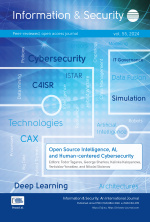Contemporary Trends in the Development of Information Security and Computer Virology
Source:
Information & Security: An International Journal ,Keywords:
Biometric, Computer Virology, Dynamic Programming, Information Security, Mobile Communications, modeling, Satellite Communications, simulation, SteganometricAbstract:
This article presents an analysis of the latest trends in information security and computer virology. The basic components of the information security are introduced, including data security, computer security, communication security, network security, mobile security, manipulations security, biometric security, and steganometric security. The main factors exerting influence on these components, as well as their relationships are shown. A formal record for the information security as a function of specific arguments is developed. The fundamental procedures of the information security are represented, including Monitoring, Blocking, Removing, Protection and Verification. The analysis continues with the computer virology topic. In the beginning, the fundamental work principles of the computer viruses are examined: Reproduction, Transportation, Malicious Thinking and Good-natured Thinking. Then the main steps in the computer viruses investigation are analyzed: Isolation, Decomposition, Formal Description, Modeling, Decision-making and Program Realization. Next, methods for computer viruses detection are examined, such as Signature analysis, Integrity Check, Monitoring and Restriction. After that the basic steps during the computer viruses removal as Localization, Identification, Removing, Deactivation and Verification are shown. In the conclusion, the role and the importance of the information security and the computer virology for the development of the contemporary society in conditions of growing communication mobility and globality are pointed out.
